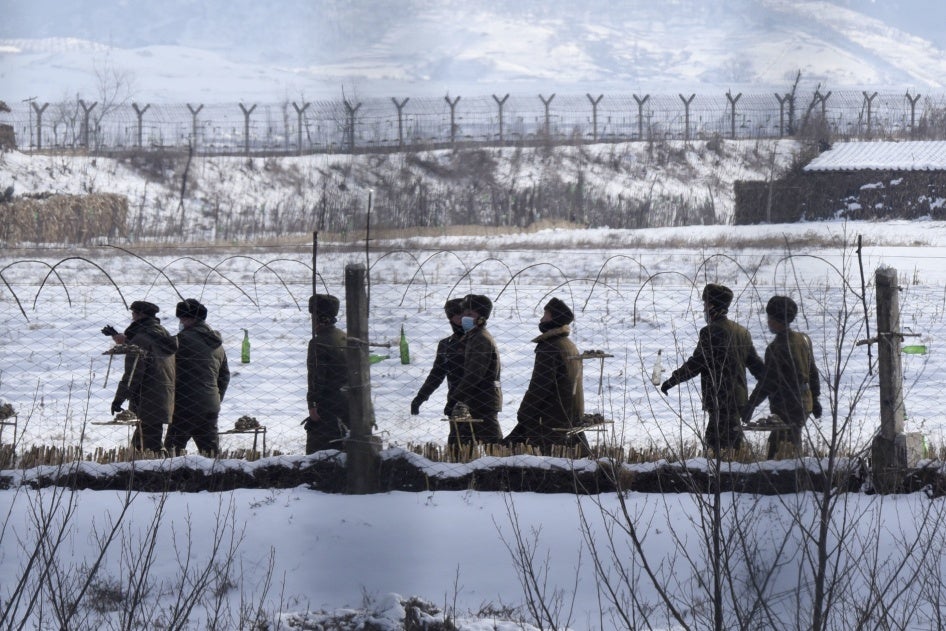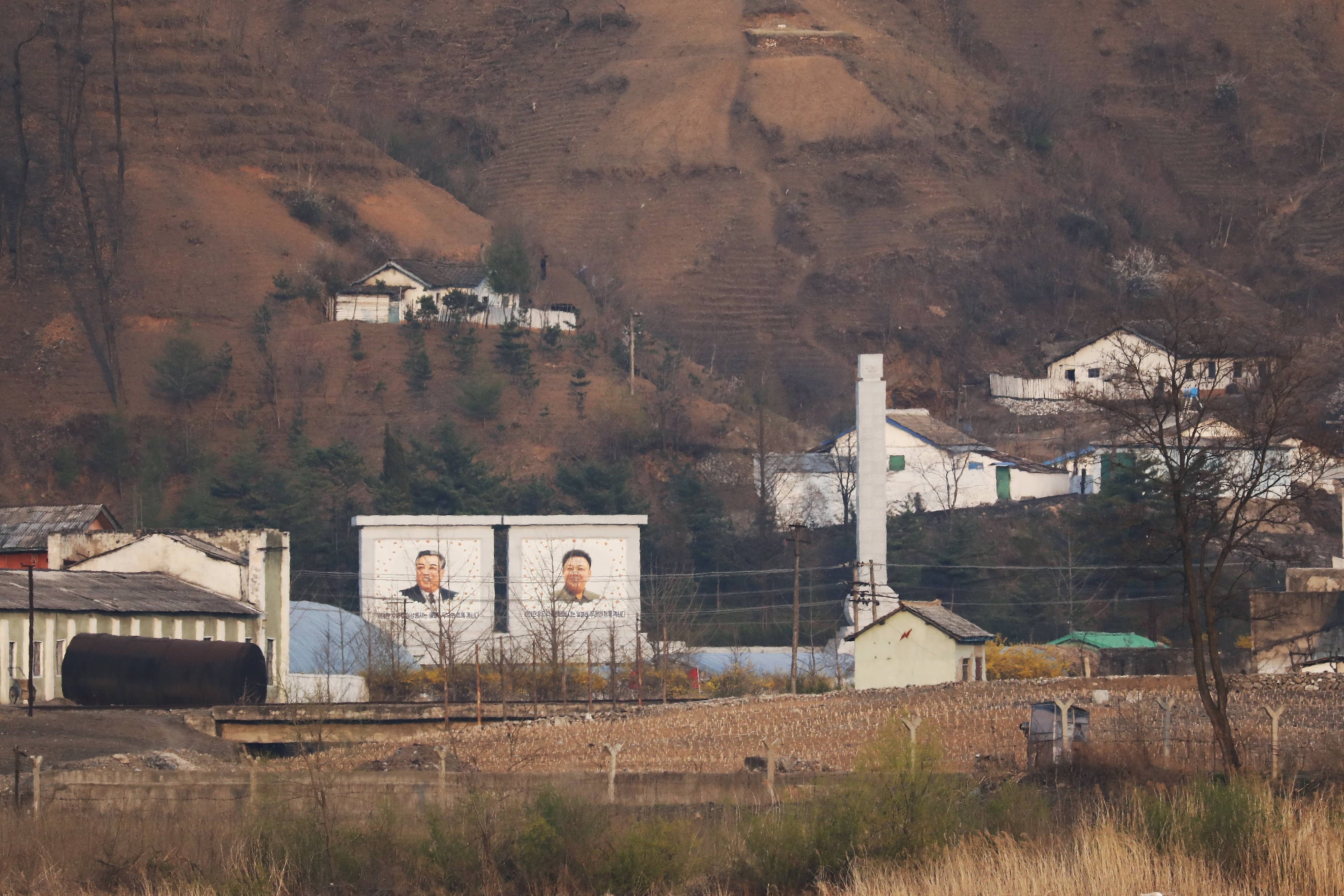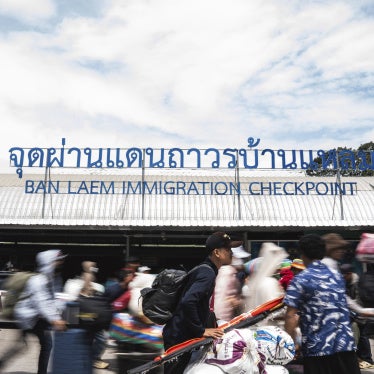- Since the Covid-19 pandemic in 2020, North Korea’s government has largely sealed its border with China and imposed overbroad, excessive, and unnecessary quarantines and restrictions on freedom of movement and trade, which have worsened the country’s already grave humanitarian and human rights situation.
- The new restrictions exacerbated existing UN Security Council sanctions, which restricted most exports and some imports, unintentionally harming ordinary North Koreans’ livelihoods and food security.
- UN member states should urgently address North Korea’s isolation and humanitarian crisis, encouraging authorities to end abusive measures and allow humanitarian aid with adequate oversight and monitoring.
(New York) – North Korea’s government under Kim Jong Un has effectively sealed its northern border with China, worsening an already grave humanitarian and human rights situation in the country, Human Rights Watch said in a report released today.
The 148-page report, “‘A Sense of Terror Stronger than a Bullet’: The Closing of North Korea 2018-2023,” documents the Democratic People’s Republic of Korea’s (DPRK or North Korea) overbroad, excessive, and unnecessary measures during the Covid-19 pandemic, including quarantines and new restrictions on economic activity and freedom of movement. The government’s new measures have severely affected food security and the availability of products needed by North Koreans to survive that previously entered the country via formal or informal trade routes from China. United Nations Security Council sanctions from 2016 and 2017 limited most exports and some imports, harming the country’s economy as well as people’s ability to make a living and access food and essential goods.
“North Korea’s sealing of its border since 2020 and the unintended effects of UN Security Council sanctions since 2017 have increased hardships on the long-suffering North Korean people,” said Lina Yoon, senior Korea researcher at Human Rights Watch. “North Korean leader Kim Jong Un should end the policies that have essentially made North Korea a giant prison, reopen its borders for trade, relax internal travel restrictions, and allow monitored international emergency assistance.”
Concerned governments should urgently address the impact of North Korea’s increased isolation on the basic rights of North Koreans. Even before new restrictions were put in place, North Korea was among the most isolated and repressive countries in the world.
From 2015 through 2023, Human Rights Watch interviewed almost 150 North Koreans outside the country, including 32 North Korean escapees with knowledge or experience of relevant conditions in recent years. Human Rights Watch also made extensive use of satellite imagery, analysis of open-source videos and photographs, interviews with journalists and activists with contacts inside the country and in China, international trade data, media reports, and academic studies.
Cross-border activities decreased in late 2017 after UN Security Council sanctions in 2016 and 2017 led China to impose strict new trade and travel controls on its side of the border. Cross-border travel and trade decreased further during the Covid-19 pandemic.
After the start of the pandemic in 2020, the North Korean government sealed the country’s borders by constructing new and expanded fences and guard posts and strictly enforcing rules, including a standing order for border guards to “shoot on sight” any person or animal approaching the border without permission. The border crackdown compounded the negative effects of earlier UN Security Council sanctions.
North Korean authorities also clamped down on bribery and various forms of low-level unsanctioned economic activity, which since the 1990s had enabled people to maneuver around overbroad governmental controls. Many families need to engage in these vital activities to obtain money or food to survive. The government also further tightened restrictions on communication with the outside world and access to information, while intensifying other ideological controls to prevent unrest.
The new restrictions enabled the government to strengthen its grip on power and reimpose control where its dominance had weakened over the past 30 years: in particular, over the border, market activity, unsanctioned travel, and access to information.
Satellite images starkly reveal the increased security enforcement on the North Korean side of its northern border after early 2020. An in-depth analysis of six selected border areas, totaling 321 kilometers, shows that North Korean authorities fenced off almost all the analyzed areas by 2022 or 2023, with almost 500 kilometers of new fences.
Most of the areas that Human Rights Watch analyzed now have two, and in one small part three, layers of fences. Images also show upgraded primary fences in several areas, new or improved guard patrol paths, as well as new garrisons, watchtowers, and guard posts. In the areas analyzed, Human Rights Watch found a 20-fold increase in security facilities since 2019. A total of 6,820 facilities have been placed near new or improved fences, an average of one every 110 meters. The government’s expanded internal security at its northern border has made almost all unsanctioned domestic and international travel impossible, whether to conduct informal commercial activities or to escape the country.
Even before the Covid-19 pandemic, North Korea was one of the poorest countries in the world. The government has long struggled to ensure food security, adequate childhood nutrition, and access to medicine. For decades, the government has prioritized the development of nuclear weapons and missile programs over basic social services, diverting billions of dollars of revenues that could have been spent on social and public services and infrastructure to spur economic growth and promote economic and social rights.
The UN Security Council should urgently review current sanctions on North Korea, and the measures states take to enforce them, to evaluate their impacts on human rights and delivery of humanitarian aid, Human Rights Watch said. They should also seek more information from UN officials about the connections between North Korea’s weapons programs and its human rights situation.
“North Koreans have lived in deprivation and isolation for decades,” Yoon said. “The UN Security Council and concerned governments should press Kim Jong Un to end the country’s systematic human rights abuses and begin a dialogue to reopen the country to the outside world.”
Selected Quotes, Accounts:
Personal details are anonymized to protect the interviewees’ identities and their families in North Korea.
A former secret police officer who left North Korea several years ago said in March 2023 that he spoke with relatives there in 2017, and then twice a year until January 2020. However, between then and December 2022, he had only been able to speak with a relative once, in January 2022, because domestic travel restrictions prevented the relative from traveling to the border area to find a broker with a Chinese phone. He said:
Life has become harder and harder every day because of Covid-19. … The transportation situation was already bad, but with the Covid-19 pandemic, people are not allowed to move around, and it has become harder to talk on [unsanctioned] phones. … There, there is constant surveillance of calls … Things there don’t change every day like [outside of North Korea]. Life was hard when I left and remains difficult, if anything life is getting tougher and tougher, much more dreadful with the Covid-19 pandemic.
A former herbal medicine trader in her 30s from Ryanggang province living oversea said in January 2023 that she could speak with her relatives once a week or two or three times a month until 2019. After 2020, she was only able to communicate with them once every two months until June 2022, and somewhat more often since then until January 2023, but still irregularly. She said:
I asked [my relative] how she is doing. … She said life wasn’t life. She repeated that twice. We were seeing each other’s faces and we all cried … it was dangerous, and we turned off the video. … My [relative] said there were no words to describe how hard life was. There was no [informal] trade with China, not even to get some rice or a bag of wheat. If [authorities] heard of a soldier allowing that, that person would just disappear ... Soldiers are very scared. … My [relative] said people in [her area] said there is not even an ant crossing the border.
A former factory worker in her 30s from a remote area near the northern border in Ryanggang province, who left North Korea in the late 2010s, said in March 2023:
We already lived in constant fear…. The authorities created a sense of terror that made us feel scared. More than the fences, the pressure [the authorities put] all around us [pressing everyone to constantly monitor each other] created a sense of terror that prevented us from escaping, because of the thought that if anyone tried to leave, we would always be caught. ... I was so scared whenever I saw the fences.
A former trader from North Hamgyong province, who had been in contact with relatives in North Korea, said in January 2023:
My [relative] catches squid and crabs in the winter. He can eat and live off that, but in North Korea all squid used to be informally sold to China. But that’s all blocked [because of the sanctions and the Covid-19 pandemic], so … they had to sell all the squid for domestic consumption … Because the value was lower, even if he caught a lot of squid, it became hard to survive. … With the border blockade, many jobs disappeared, so it was harder for people to survive.
A former trader in her 50s from Ryanggang province who left North Korea in the late 2010s said in May 2021:
After informal trade was blocked [with the UN sanctions since 2018], there was no more rice coming [from China]. …. There we say that one smuggler feeds 11 people ... If smuggling stops, all stops for people who made money [connected to smuggling] ... If smuggling stops, the authorities who got our money also cannot. … They all made money from the smuggled goods … If smuggling stops, all market activity stops.
A former trader in his 40s, who left North Korea in the late 2010s, recalled earlier crackdowns on informal trade and said in May 2021 he did not want to imagine how life was now in North Korea. He said:
Smuggling became very hard under Kim Jong Un’s rule. Informal trade became vibrant during Kim Jong Il’s time. Since 2013 and 2014, [smuggling] became difficult. To get products from China [through informal trade], we needed the support of soldiers covering the border [by paying them bribes to look the other way], but [many] border guards could not [accept bribes] anymore [because of the crackdown on corruption] … the authorities started ideological education for the soldiers… and even if we tried, the soldiers rejected the attempts… at the time, people who tried to do smuggling got caught and were executed. Then prices of products went up… when prices increased, those who used to eat white rice, ate rice mixed with corn… those who used to eat rice mixed with corn, ate just corn. Prices of corn went up. Then people made noodles with corn powder, then potato prices increased. Prices of all products rose. People went hungry. Aside from being hungry, many people didn’t have money to spend, so they could not buy clothes or necessities. You could easily see that on the streets. More people who stopped doing laundry, with raggedy clothes and dirty hair … I saw that in 2013 and 2014. The situation must be unimaginably worse by now.
A former informal trader from Ryanggang province who left North Korea in the late 2010s, said in June 2021:
I do not think it is an exaggeration to say people in Hyesan city would die if smuggling were blocked. Chinese products are essential for the survival of North Korean people. Domestic products are not enough to cover the country’s needs. ... Almost everybody in Hyesan city lives off connection with smuggling or official trade. ... I cannot think about it.










